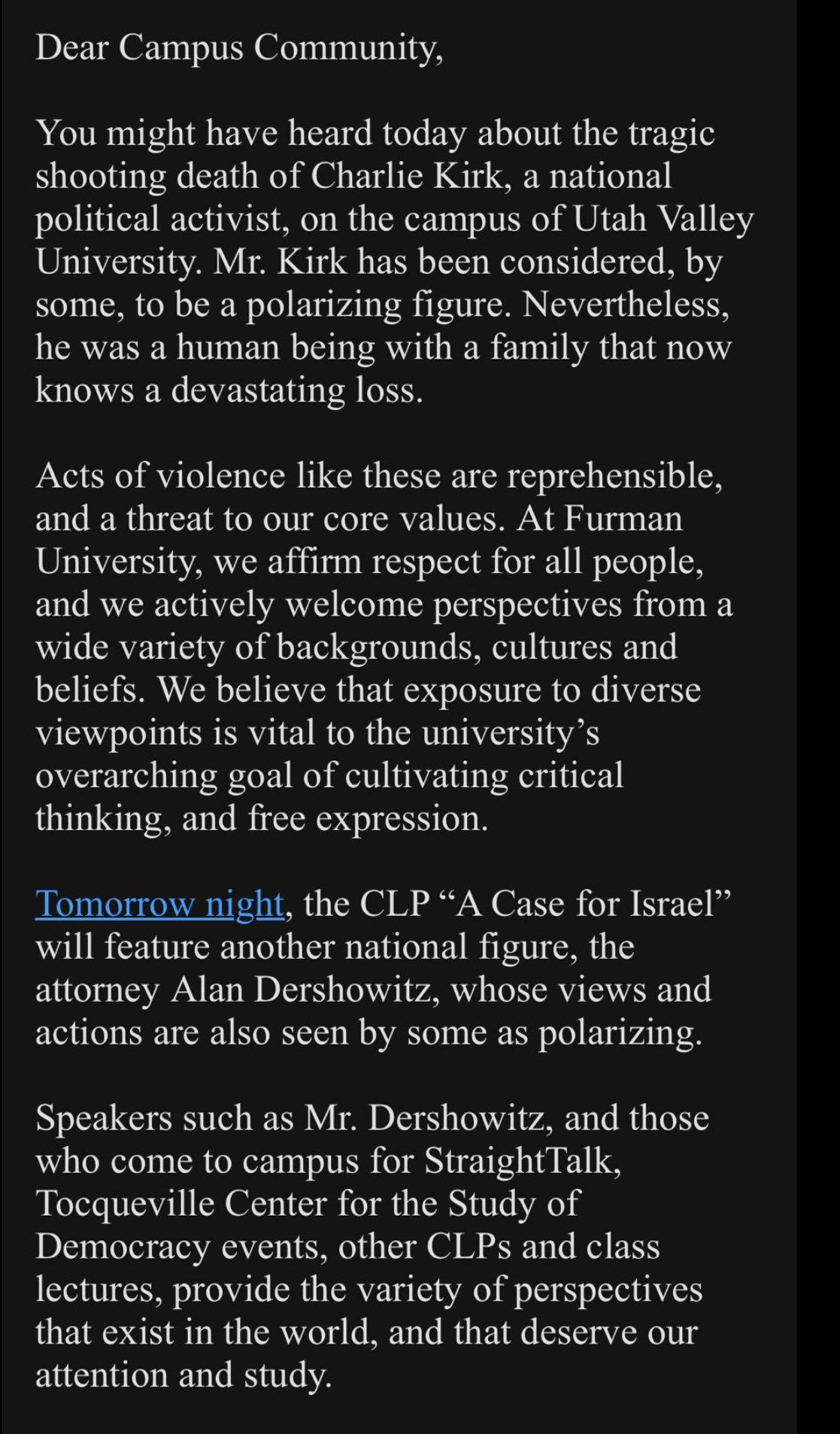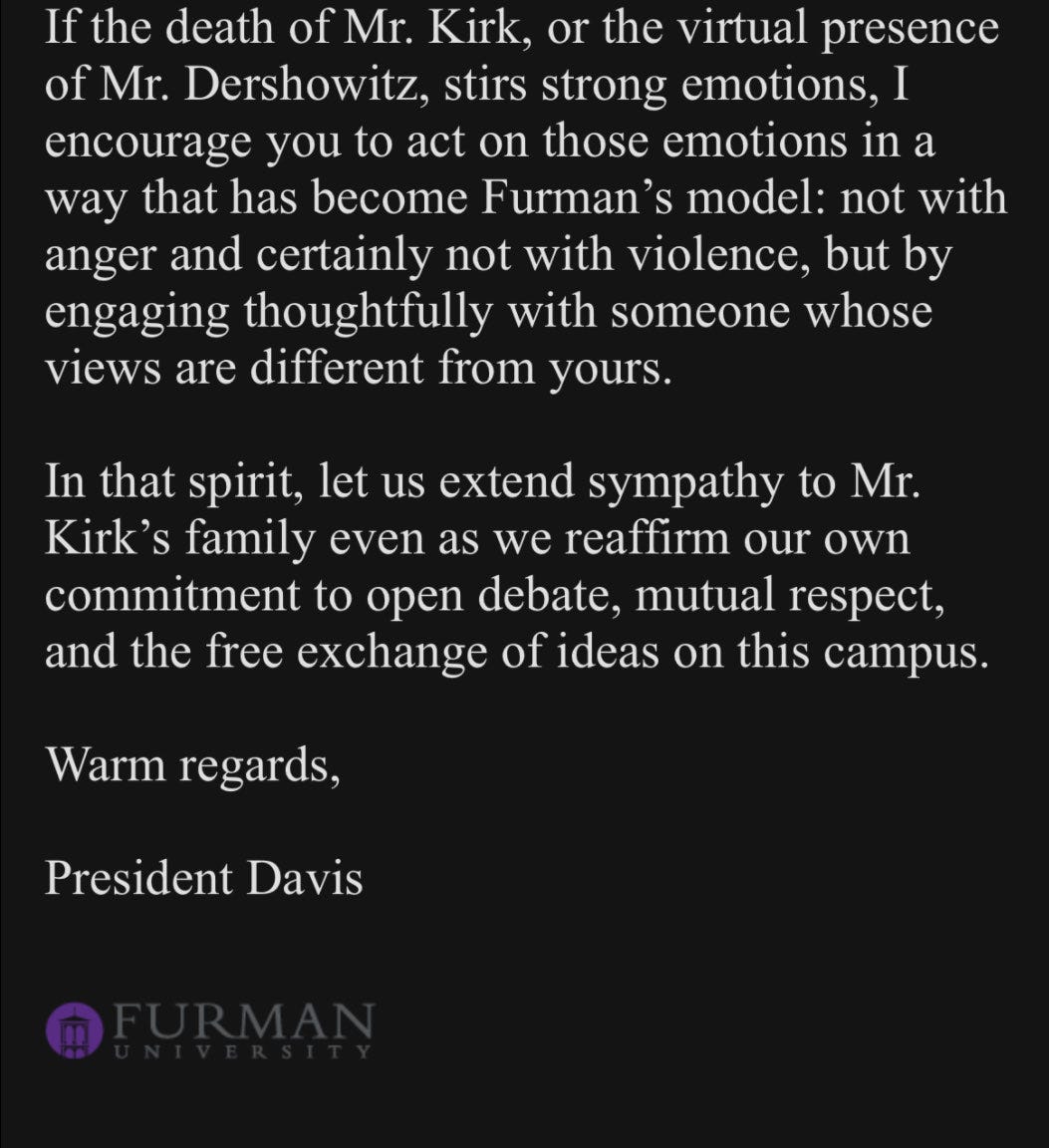A Tribute to Charlie Kirk and Furman's Disappointing Response
Charlie Kirk was a champion for freedom of speech on college campuses. His awful assassination at Utah Valley University only makes this issue more important.
Charlie Kirk was 31. He was a Christian, a family man, and a patriot.
His assassination — which occurred at Utah Valley University on September 10 — has robbed a wife of her husband, two children of their father, and our country of one of its best and brightest young leaders.
Kirk was also one of our nation’s greatest champions for free speech. He not only believed in the First Amendment as a legal principle or defended it as an idea; he lived it out. He frequently visited college campuses, inviting students who disagreed with him to engage in healthy, civic debate.
When asked why he insisted on doing this, Kirk said:
“[W]hen people stop talking, really bad stuff starts. When marriages stop talking, divorce happens. When civilizations stop talking, civil war ensues. When you stop having a human connection with someone you disagree with, it becomes a lot easier to want to commit violence against that group… What we as a culture have to get back to is being able to have a reasonable disagreement where violence is not an option.”
He’s right. And that’s why one of our core missions at FFSA is to ensure people at Furman keep talking and engaging with one another respectfully.
And that brings me to the way Furman responded to Kirk’s death.
President Davis put out a statement to the campus community about Kirk’s assassination the same day, which you can read in full below:
Davis deserves some credit for making a statement. She also deserves credit for being clear about Furman’s commitment to free speech, writing that:
“Acts of violence like these are reprehensible and a threat to our core values.”
“Furman’s model” is to react “not with anger and certainly not with violence, but by engaging thoughtfully with someone whose views are different from yours.”
However, other parts of her message seem to serve no other purpose than to placate left-wing faculty and students who despise conservatives like Kirk.
For example, the statement's very first sentence says:
“Mr. Kirk has been considered, by some, to be a polarizing figure. Nevertheless, he was a human being with a family that now knows a devastating loss.”
Calling Kirk “polarizing” after his assassination serves only to deligitimize him, cast aspersions, and suggest that Furman didn’t approve of him.
This the wrong message to send if President Davis wants Furman to be a place that champions free speech not only in its administration’s slogans but also in the spirit of its faculty and student body.
Not only that, President Davis ended her statement by saying:
“Let us extend sympathy to Mr. Kirk’s family even as we reaffirm our own commitment to open debate, mutual respect, and the free exchange of ideas on this campus.” (emphasis added)
Even? It is hard to figure out what President Davis means here. Is she really telling us that extending sympathy for Mr Kirk’s example is somehow incompatible with Furman’s commitment to open debate, mutual respect, and the free exchange of ideas?
Is she really saying: “Don’t worry; extending sympathy to this man’s family doesn’t mean we are changing anything about the way we approach free speech”?
But, here’s the thing, Charlie Kirk’s murder should change the way we approach free speech.
It should clarify the stakes of this issue. And it should make us eager to become a community where people like Kirk aren’t merely begrudgingly tolerated, but celebrated for their compassion, openness, and courage to engage with people who disagree with them.





Charlie Kirk was not an advocate for free speech for all. He was responsible for TPUSA's "Professor Watchlist", a doxing website that lists college professors with views that Kirk and his followers disagree with. Professors on this list, and their families, are then deluged with hundreds of death and rape threats for their constitutionally protected free speech.
I agree 110% with what you wrote. Furman can and should do better. I disagreed with about 80% of what Charlie said, but I would never go so far as to call him "polarizing." He made college kids think. I didn't see him as out to change hearts or minds. He just engaged and didn't flinch in his beliefs. There is a dearth of that these days. And patting herself on the back for having Alan Dershowitz on campus was unnecessarily gratuitous.